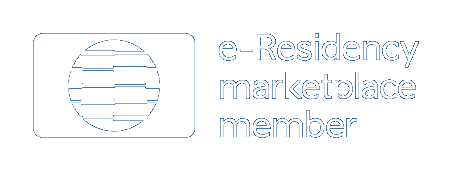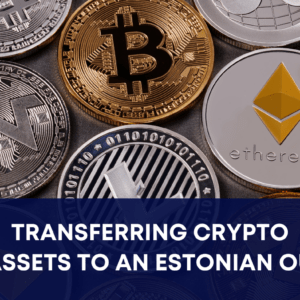Q&A with NOMADS. insure: What Obtaining a Business Licence in Estonia Looks Like
There’s a list of business activities that require a licence in order to legally operate in Estonia. For example, if you’re dealing with finance and financial activities, tourism, the labour market, or insurance, you MUST go through the licencing process according to Estonian laws before conducting any official business.
You can find out if you need a licence to start a business in Estonia by checking out the full list of requirements in the State Portal.
To provide more insight on obtaining a business licence in Estonia, we decided to interview our advisory board member, Christoph Huebner, who recently went through the process of applying for an insurance brokerage licence in Estonia.
Although he serves as a shareholder for an insurance brokerage in Germany, Huebner founded his new brokerage, NOMADS.insure, in Estonia this past summer. He has extensive knowledge and experience with the Estonian licencing process regarding the requirements, time frame, costs, steps involved, and more.
Here’s what he had to say in our Q&A session on what that process looks like:
Q: Why were you interested in a licence in Estonia while you are a shareholder of a German insurance brokerage company?
A: I have a closer affiliation to the Estonian business environment than any other. I have a good network here, I have my holding company here, and I know how things work, so things are actually easier for me here in Estonia than in Germany. Also, I am no longer a resident of Germany, so obtaining the licence there would probably be much more complicated. To top it off, the process of incorporating a company in Estonia was much faster and easier than in Germany.
The second part of the answer is more important, which is that our market is global (or at least European). We have clients in Germany, but we cater to the European market as a whole, and with the licence in Estonia, we are allowed to approach the entire EAA market. This is important because the insurance industry is highly regulated; if you want to market insurance services you need to be licenced in the country where your clients are located.
Let’s say, for example, a French person travels to Thailand to start a digital nomad career and finds out that they might be better off having a health insurance plan. If they approach us while being in Thailand, we can’t market our services because we would have to have a Thai business licence to help that individual. In the end, it comes down to the question: under which law of which country is the mediation governed?
Of course, we aren’t approaching anyone in Thailand because our licence is valid in the European EA since that’s where our core market is. But thankfully under Estonian law, we only need one European licence to practice in all EEA countries; this licence allows us to “passport” the licence according to European freedom of services.
Q: What are some of the differences between getting a licence in Germany and in Estonia?
A: Although they follow the same European framework, there are some big differences between the licencing process in Estonia vs Germany. The first difference has to do with proving your professional experience.
This step is much more complicated in Germany – complicated in the sense that you have to do a 3-year full-time apprenticeship where you obtain the needed certificate and learn all the good and bad habits of the industry. By the end of that apprenticeship, you are very conformed to the industry standards (and that is one of the reasons why the German insurance industry is so adverse to innovation).
In terms of similarities in the process, here’s what you need in both countries:
- Professional liability insurance
- A clean criminal record
- Proof of your professional experience (but in different ways as mentioned above)
In Germany, you need to send a copy of the certificate you obtained from your apprenticeship. You’ll also need to provide a tax certificate from the German tax authorities to state that you are free from tax arrears and have filed your tax declarations on time. In Estonia, you simply have to self-declare the necessary tax information.
As for the professional certificate, there is no such thing in Estonia, so you’ll need to prove your professional competence in another way: by providing full documentation of your internal rules regarding how you run your company.
In addition to including the standards for consulting your customers, you’ll need to give details on how you deal with customer data according to data protection laws by drafting out what happens from the first contact with the client all the way to ending the contract (even years after ending the contract). You also need to state how you manage your IT systems. That is in a nutshell what you have to include in a 60-page document, which needs to be filed in the Estonian language.
To help with this part of the process, we hired a local insurance law expert and wrote the internal rules in English, which were later translated into Estonian. It is mandatory to submit the documents in Estonian, but I would suggest filing the application in both Estonian and English. The Finance Inspection wants to be sure that the submitting person fully understands the content, so providing the document in 2 languages allows them to confirm that the info is the same in both.
Q: How long did it take you to officially obtain the licence?
A: Overall, it took 1.5 years and 2 attempts. The first attempt took 1 year and 3 months. With the knowledge and experience gained from the first attempt, the second attempt went much faster.
Q: What are the expected costs of the licencing process?
A: You can expect to spend at least 5,000 € on the whole process. 1,000 € is the annual minimum fee paid after processing your application.
If the licence isn’t received at the beginning of the year but during the 2nd half of the year, you only need to pay 500 € for that licencing year. You’ll also want to factor in additional costs of lawyer fees, which will vary depending on the complexity of your specific process.
Hopefully, this Q&A interview provided you with some helpful information on what to expect when starting a licenced business in Estonia. Although the process may seem daunting – and may take more than 1 attempt – obtaining an Estonian licence comes with a lot of benefits.
Do you have a business that needs a licence or you are not sure whether you need a licence?
Silva Hunt is ready to give you expert advice and guide you through the process.





 Schedule a call
Schedule a call
 Send a message
Send a message